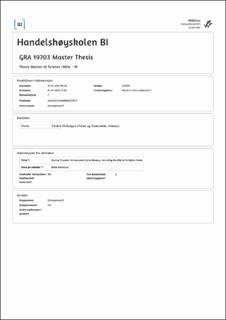| dc.description.abstract | We research the effect of housing and the Boligsparing for Unge (BSU) savings account on portfolio allocation and performance. By applying the mean-variance optimality framework to form portfolios, we use the Sharpe Ratio and tests of differences in return variance and mean to investigate performance. Graphing the efficient frontier, we find higher Sharpe Ratios for optimal portfolios with the BSU, which decreases when increasing housing. Without the BSU, portfolios with housing tend to use available cash towards reducing leverage. We conclude that portfolios with the BSU are less volatile, but do not offer significantly higher returns compared to the housing market. Still, the BSU is Norway’s best savings scheme in the pursuit of achieving homeownership. | en_US |
